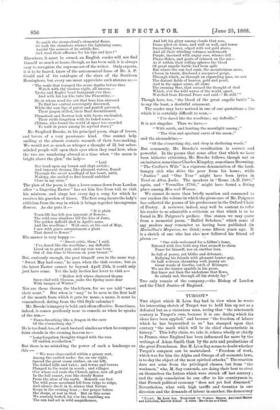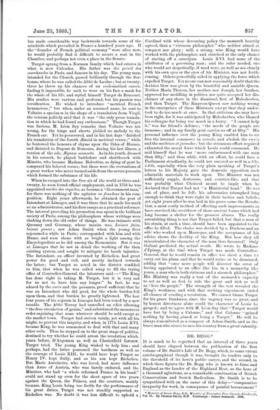TURGOT.*
THE object which M. Leon Say had in view when he wrote his interesting sketch of Turgot was to hob! 'him up not as a defeated but as a victorious man, seeing that "the nineteenth century is Turgot's own, because it is one during which his ideas have been applied," and because "the freedom of labour which he has bequeathed to us" has stamped upon that century "the mark which will be its chief characteristic in history." This lofty claim, we take it, relates wholly or chiefly to France, since England has been influenced far more by the writings of Adam Smith than by the acts and productions of the great Frenchman. But M. Loon Say seems to doubt whether Turgot's conquest can be maintained. "Freedom of work, which was for him the Alpha and Omega of all economic laws, is to-day the object of the most spirited attacks." The reaction does not arise from the privileged classes, but from "the workmen," who, M. Say contends, are doing their best to rivet on themselves the fetters which were struck off last century ; and the only consolation he can offer to his countrymen is, that French political economy "does not yet feel disarmed." Nevertheless, what with high tariffs and • bounties in one direction and the demands of labour in another, the democracy • Turgot. By Leon Bey. Tranilated by Gnetave MBES011, dafinantaaater and Librarian, Harrow School. L onion: Honlelge aid Sons.
has made considerable way backwards towards some of the mischiefs which prevailed in France a hundred years ago. If the "founder of French political economy" were alive now, be would probably find it difficult to secure a seat in the Chamber, and perhaps not even a place in the Senate.
Turgot sprang from a Norman family which had estates in what is now Calvados. His father was the premIt des marchandes in Paris, and famous in his day. The young man, intended for the Church, passed brilliantly through the Sor- bonne, where he was called the Abbe de Laulne ; but at twenty- three he threw up his chances of an ecclesiastical career, finding it impossible, he said, to wear on his face a mask for the whole of his life, and styled himself Turgot de Brucourt. His studies were various and profound, but his passion was versification. He wished to introduce "metrical French hexameters ;" but when, under an assumed name, he sent to Voltaire a specimen in the shape of a translation from Virgil, the veteran politely said that it was "the only prose transla- tion in which he had found any enthusiasm." Though Turgot was furious, M. Leon Say remarks that Voltaire was not wrong, for the longs and shorts yielded no melody to the French ear. Yet he persevered, and in his last days "finished his translation of the fourth 2Eneid in metrical verses ;" while he bestowed the honours of rhyme upon the Odes of Horace, and dictated to Dupont de Nemours, during his last illness, a version of the ode, 20quam memento. As in his youth, dressed in his cassock, he played battledore and shuttlecock with Minette, who became Madame Helvetius, so dying of gout he composed his beloved verses ; but these were the recreations of a great worker who never turned aside from the severe pursuits which formed the substance of his life.
When he escaped into the free air of the world at three-and- twenty, he soon found official employment, and in 1753 he was appointed maitre des requetes, as became a " Government man," for there was nothing of the agitator or frondeur in his com- position. Eight years afterwards, he obtained the post of Intendant at Limoges, and it was there that he made his mark as an administrator, and his first essays as a practical reformer. The interval preceding his promotion was spent in the brilliant society of Paris, among the philosophers whose writings were shaking down the old order of things. He was intimate with Quesnay and Gournay, whose maxim was, Laissez faire, laissez passer ; saw Adam Smith when the young Scot sojourned a while in Paris ; corresponded with him and with Hume, and soon shone with as bright a light among the Encyclopmdists as he did among the Economists. But it was at Limoges that he saw in detail the working of the then existing system, and sought to mitigate its harsh injustice. The Intendant, an officer invented• by Richelieu, had great power for good and evil, and mostly inclined towards the latter ; but Turgot so acted in the district confided to him, that when he was called away to fill the trying office of Controller-General, the labourers said :—" The King has done right in taking M. Turgot, but it is very sad for us not to have him any longer." In fact, he was adored by the cures and the peasants, proof sufficient that he was an Intendant who did good, for the whole burden fell upon them, and that burden he greatly lightened. The last four years of his sojourn in Limoges had been vexed by a new trouble. The Abbe Terray had cancelled an edict allowing "the free circulation of grains," and substituted the monstrous order enjoining that none whatever should be sold except at the market town. Turgot had striven vainly, yet with all his might, to prevent this iniquity, and when, in 1774, Louis XVI. became King, he was summoned to deal with that and many other evils. Thus he stepped on to the great stage of politics, destined to try whether he could arrest the revolution which, years before, D'Argenson as well as Chesterfield foresaw. Turgot tried. The young King wished to help him ; and perhaps, had the latter possessed the hardness as well as the courage of Louis XIII., he would have kept Turgot as
Henry IV. kept Sully, and as his son kept Richelieu.
But Marie Antoinette, who was loved, had more influence than Anne of Austria, who was barely endured, and the Minister, who had "a whole reformed France in his head," could not stand up even for the short space of two years against the Queen, the Princes, and the courtiers, mainly because, King Louis being too feeble for the performance of his great duties, Turgot was not steadily supported as Richelieu was. No doubt it was less difficult to uphold a
Cardinal with whose devouring policy the monarch heartily agreed, than a "virtuous philosopher" who neither aimed at conquest nor glory ; still, a strong, wise King would have worked with the philosopher, and clutched at the only chance of staving off a cataclysm. Louis XVI. had none of the attributes of a governing man ; and the ruler needed, one who would act despotically, if need were, as well as see clearly with his own eyes or the eyes of his Minister, was not forth- coming. Others powerfully aided in applying the force which expelled Turgot. Yet no one can now reasonably doubt that the decisive blow was given by the beautiful and amiable Queen. Neither Maria Theresa, her mother, nor Joseph, her brother, approved her meddling in politics, nor quite accepted her dis- claimer of any share in the dismissal, first of Malesherbes, and then Turgot. The Empress-Queen saw nothing wrong in the enterprises of these Ministers except that they under- took to do too much at once. In that criticism she may have been right, for it was anticipated by Malesherbes, who blamed his colleague for being too much in a hurry. "I cannot help it," VMS his friend's defence; "the needs of the people are immense ; and in my family gout carries us off at fifty." His personal influence over the young King enabled him to set free the internal commerce in cereals, and abolish the corvee and the maitrises et jurandes ; but the strenuous effort required exhausted the moral force which Louis could command. He said himself that he was "more embarrassed with one man than fifty," and thus while, with an effort, he could face a Parliament steadfastly, he could not succeed so well in a tete- a-tete, especially when the very plain speaking of Turgot's letters to his Majesty gave the domestic opposition such admirable materials to work upon. The Minister was not sufficiently supple, dexterous, and courtier-like, and that was probably what Choiseul meant to imply when he declared that Turgot had not "a Ministerial head." He was out of place, and he fell ; his adversaries triumphed long enough to think they were right in their tactics and beliefs ; yet eight years after he was laid in his grave came the Revolu- tion, a most costly method of effecting such improvements as have survived the overthrow of those ancient forms which had long become a shelter for the grossest abuses. The really astonishing thing is not that Turgot failed, but that a man of his strain, at such a time, should have been appointed to the office he filled. The choice was decided by a Duchess and an abbe who worked upon Maurepas, and the acceptance of his advice shows the docility of the King. But how they all miscalculated the character of the man thus favoured ! Only Ga.liani predicted the actual result. He wrote to Madame d'Epinay, at the time when Turgot was made Controller.. General, that he would remain in office too short a time to carry out his plans, and that he would retire or be dismissed, adding that "once more people will discover the error of having appointed to an office like his, in a monarchy like yours, a man who is both virtuous and a staunch philosopher." His Ministry was really a test of the monarch's capacity to act as well as feel, to rule the great and rich as well as "love the people." The strength of the test revealed the King's weakness, and with that striking experiment ended all chance of evading a revolution. We cannot blame Turgot for his grave frankness, since the urgency was so great, and by honest directness alone could the character of Louis be gauged ; and we agree with M. Leon Say that "Turgot would have lost by being a Calonne," and that Calonne "gained nothing by having Aimed at being a Turgot." He will be always remembered as a compeer of Adam Smith, and as the brave man who strove to save his country from a great calamity.







































 Previous page
Previous page